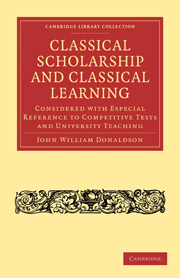 Classical Scholarship and Classical Learning
Classical Scholarship and Classical Learning III - Scholarship and Learning
Published online by Cambridge University Press: 05 October 2010
Summary
Even among those who have gone along with me in the previous discussion, there will be some, who will maintain that classical learning is not cultivated as it ought to be in this country, and that the amount of time and labour bestowed on classical acquirements is out of all proportion to the results, which we secure. That there is some truth in this view of the matter it seems impossible to deny; and I have long thought that the account between scholarship and learning might be more accurately and fairly balanced; that we might gain somewhat more of the latter without relinquishing what we already have of the former; that the practical skill, on which we pride ourselves, might be retained without any sacrifice of the scientific knowledge, which we might acquire in greater measure; that the educational test might be all that it is without seeming to close the access to a progressive development of the studies on which it rests; and that by a better arrangement of our school training, we might do all we now attempt, and even more, in Greek and Latin without seeming to devote all the years of boyhood to studies, in which only a few can attain to any striking proficiency. I shall therefore conclude this discourse by explaining those improvements in our method of teaching and examining, which seem to me most likely to effect the desired objects.
- Type
- Chapter
- Information
- Classical Scholarship and Classical LearningConsidered with Especial Reference to Competitive Tests and University Teaching, pp. 126 - 206Publisher: Cambridge University PressPrint publication year: 2010


